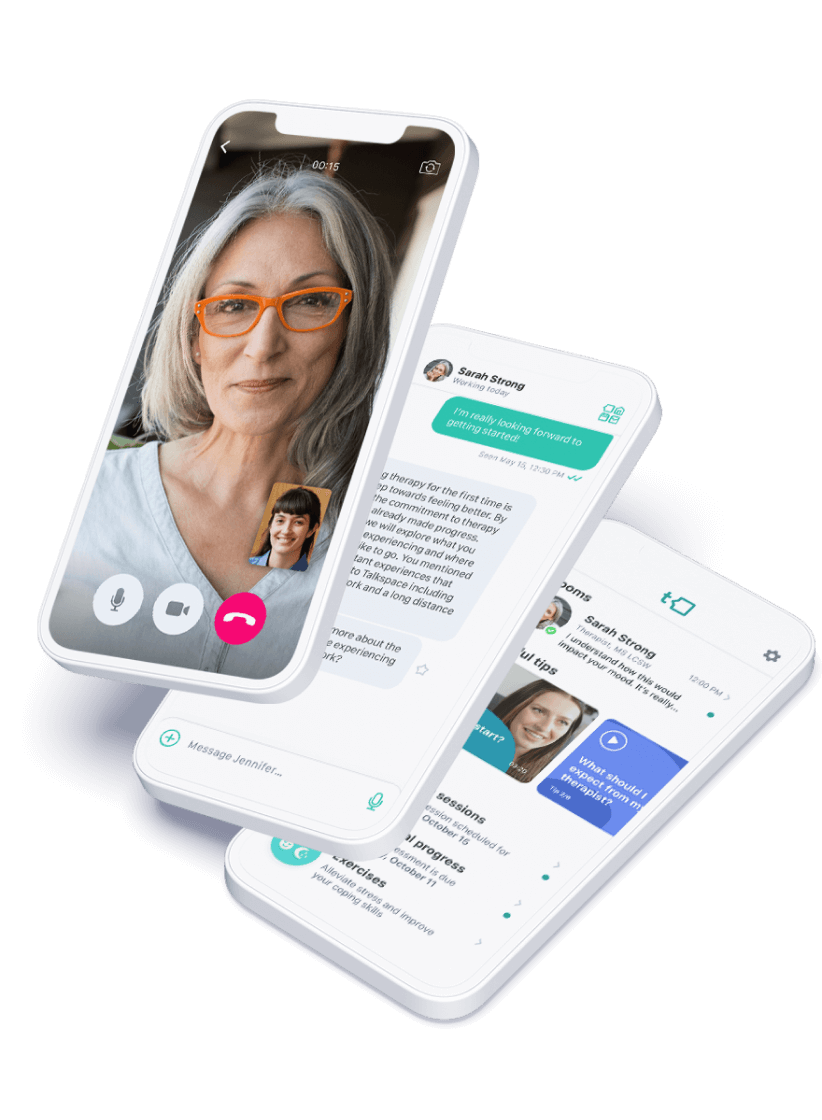Updated On: May 3, 2024
Overview
Depression can be a normal reaction to a major life event or time you’re trying to navigate a particularly stressful situation. Things like grieving the loss of a loved one, going through a divorce, or experiencing a sudden loss of income can all culminate in feelings of sadness, fear, or gloom. While it’s common, and even normal, to have a low mood on occasion, certain depression symptoms might be pointing to a more serious issue that requires the help of a trained mental health professional or healthcare provider.
Not everyone experiences the same signs of depression. Clinical depression can have both mental and physical symptoms and some of them can be easier to detect than others.
Clinical depression (or major depressive disorder) symptoms last for longer periods of time — at least 2 weeks — and are disruptive to daily activities like sleeping, eating, and going to work or school. They tend to recur without a precipitating event.
According to 2020 National Institute of Mental Health (NIMH) statistics, it’s estimated that 21 million American adults have experienced one depressive symptom or more over the last year.
Signs of Depression
Struggling with a low mood after a disappointment or when under unusual amounts of stress is a normal human emotion. In the right situation, it can even be healthy. How to get diagnosed with depression is more than just having the blues, though. It’s accompanied by certain, very specific signs and symptoms that manifest in behavioral or physical ways. Mental health professionals use the Diagnostic and Statistical Manual of Mental Disorders (DSM-5) to make a clinical depression diagnosis.
“Depression looks different in everyone, but there are some key signs to look out for. These can include, but are not limited to: general feelings of sadness which can last for a long period of time that can seemingly come on for no reason, hopelessness, loss of interest in things that you normally like to do, irritability, and changes in sleep patterns. For some, there’s increased fatigue and for others there’s insomnia. There can be changes in appetite, uncontrollable emotions, and feeling withdrawn.”
 Licensed Clinical Social Worker (LCSW), PhD Reshawna Chapple
Licensed Clinical Social Worker (LCSW), PhD Reshawna Chapple
A drastic change in behavior can be a sign that you’re experiencing a major depressive episode. Being in a depressed mood can make you lose the ability to feel pleasure, even in activities you once enjoyed. In cases of severe depression, uncontrollable crying and/or emotional outbursts can occur. This pendulum swing of behaviors that range from being completely drained of energy, to having feelings of anxiety or restlessness, are great examples of how a depressive symptom can affect your life in different ways.
The main signs of depression include (but aren’t limited to):
- Changes in sleep — sleeping too long or not enough
- Onset of acute insomnia
- Moodiness and/or irritability that’s a reflection of sadness
- Loss of hope
- Loss of appetite
- Overindulging in food
- Substance abuse
- Engaging in risky behaviors
- Suicidal thoughts
- Having an overwhelming sense of sadness
- Feeling lonely, despair, or other sedating moods
Symptoms of Depression
Symptoms of depression can be found in behaviors, thought patterns, emotions, physical, and mental health.
Behavioral pattern symptoms of depression can look like:
- Not wanting to socialize or go out
- Withdrawing
- Change in work habits
- Using alcohol and drugs
- Having difficulty concentrating
Thought pattern symptoms of depression can cause you to have thoughts like:
- You’re worthlessness
- Everything’s your fault
- You’re a failure
- Others would be better off without you
- Life isn’t worth living
Emotional symptoms of depression can cause you to have feelings like:
- Unhappiness
- Guilt
- Overwhelmed
- Frustration
- Sadness
- Disappointment
- No confidence
- Irritability
- Indecisiveness
- Misery
Physical symptoms of depression may include:
- Vague aches and pains, such as headaches
- Moving, talking, or thinking more slowly
- Fatigue
- Lack of energy
- Changes in appetite
- Weight loss or weight gain
- Insomnia or other sleep issues
It’s also important to know about the behavioral, emotional, and physical symptoms that can impact how you think and the decisions you make. These mental depression symptoms include difficulty concentrating, forgetfulness, pessimistic attitudes, and repetitive or intrusive thoughts.
“Symptoms of depression include feelings of sadness, anger, or irritability, loss of interest in doing activities or being around people, difficulty concentrating, poor hygiene, and frequent headaches or body aches. Sometimes depression can affect people’s productivity, their feelings of self-worth, and their self-esteem. Know that if you’re experiencing these symptoms, help is out there, and there is hope that you can heal.”
 Licensed Clinical Social Worker (LCSW), PhD Reshawna Chapple
Licensed Clinical Social Worker (LCSW), PhD Reshawna Chapple
Managing Symptoms of Depression
While there’s no cure if you’re diagnosed with severe depression, there are many ways you can learn to manage the signs and symptoms of depression.
Treatment plan: The right depression treatment option can result in a much-improved quality of life. Any depression treatment program must begin with an understanding of what depression is. Part of how to treat depression comes from being clear about which signs and symptoms of depression you’re most vulnerable to.
Avoid the stigma: It’s so important that you avoid internalizing any negative connotations or cultural stigmas associated with depression or any other mental health condition. Many people suffer in silence and never seek a treatment option because they fear what others might think. Feelings of shame shouldn’t prevent you from getting the help you need. You deserve to live a healthy, happy life, and treating your depression can help you do that.
Learn everything you can: Educate yourself and those around you to help create a culture of awareness and recovery. Learn more about the different types of therapy for depression along with the different natural remedies for depression. Depression is a common, very treatable condition, and with early detection and ongoing treatment, you can gain control over symptoms and go back to enjoying your life.
“Some of the best ways to manage depression are focusing on lifestyle changes. For example, making sure you’re getting in some movement daily, adhering to a sleep schedule, and eating a healthy balanced diet. If you’re experiencing symptoms of depression, don’t wait to reach out to a licensed therapist or psychiatrist so you can explore what’s been going on and discuss ways you can begin to feel better. You deserve help.”
 Licensed Clinical Social Worker (LCSW), PhD Reshawna Chapple
Licensed Clinical Social Worker (LCSW), PhD Reshawna Chapple
Clinical treatment options may include:
- Individual therapy
- Talk therapy
- Online therapy
- Group therapy
- Medication
- Community support groups
- Specific therapy techniques such as cognitive behavioral therapy (CBT), psychotherapy, and or holistic therapies that focus on treating the whole person
When to Seek a Professional
When depression symptoms last for 2 weeks or longer, you should seek the help of a mental health professional. This could be a psychotherapist, a psychiatrist, mental health counselor, or as a first step, your healthcare provider.
Clinical depression is more than a “bout of the blues” and can have far-reaching and negative consequences when it goes undiagnosed and undetected.
Depression can be isolating, which often makes it difficult for some people to reach out for help. Sometimes, it’s through the help or support of a family member, coworker, or friend that you might be able to get help. If a one-on-one discussion isn’t helpful, a group mental health crisis intervention might be a good alternative.
There are a few critical times when it’s absolutely essential that you seek professional help. This can include any time there’s:
- Verbalizing, writing, or insinuating any thought or act of suicide
- Behavior that may lead you to hurt yourself or someone else
- Reckless, impulsive, or aggressive behavior, especially if it’s combined with alcohol or drug use
- A significant shift in mood, sleeping or eating that’s drastic and/or acute and without medical reasons (like brain trauma)
Sometimes, simply talking with a therapist or doctor gives you enough insight to see that the signs of depression really can be treated. Believing that a very good, healthy life is possible might be exactly what you need.
If you’re experiencing worsening signs and symptoms of depression, you should get help. Seeing your doctor can be a good first step to rule out a medical condition or the possibility of your depression being a side-effect of a medication you’re taking. You can also use our online depression test as a way to identify if you are experiencing this condition. Remember, that first step is the most important one. You don’t have to live with the depression symptoms that are ruling your life. There is help for you.

Dr. Reshawna Chapple, PhD, LCSW is a Therapist and Peer Consultant at Talkspace. She is a California born - Florida based Licensed Clinical Social Worker and an Associate Professor of Social Work at the University of Central Florida. Her areas of research, teaching and practice include the intersection of race, gender and ability, intimate partner violence and trauma recovery, and access to culturally responsive mental health treatment for Black women and Deaf women.
Articles about Depression: Symptoms, Causes & Treatment
View all articles
What to Do if Your Teenager is Making You Feel Depressed

Post-Weaning Depression: Recognize the Signs & Find Support

How to Think Positive When Depressed: Techniques for a Brighter Outlook

Have You Fallen Out of Love, or Are You Depressed?

How to Prevent Postpartum Depression

How to Explain Depression to Someone

Are There Stages of Depression?

Can Adderall Cause Depression?

Can Depression Cause Memory Loss?

14 Effective Coping Skills for Depression


